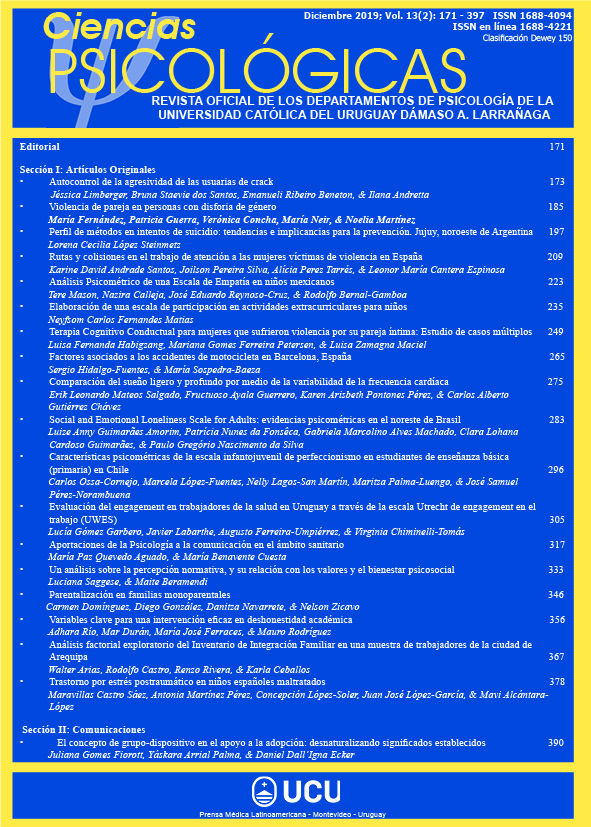Psychometrics characteristics of the child and adolescent perfectionism scale in primary school students in Chile
DOI:
https://doi.org/10.22235/cp.v13i2.1886Keywords:
perfectionism, psychometric, primary education, personality, psychologyAbstract
The present study seeks to validate a Chilean adaptation of the CAPS scale, of Spanish origin, in Chilean primary school students, through the analysis of psychometric characteristics. The participants were 1195 Chilean students between the ages of 10 and 17 years old (M = 12.5; D.E. = 1.38); the instrument used was the child-adolescent perfectionism scale (CAPS). The dimensionality, reliability, and frequency ranges of the test were analyzed in the sample. The results give an account of three dimensions, with a high general reliability level of .89, according Cronbach's alpha; and an adequate level in its dimensions, alpha values between .722 and .794. It is also observed in the sample that the effort-oriented perfectionism (EOP) is the characteristic with the highest score, while the socially prescribed perfectionism (SPP) characteristic the lowest. It is concluded that the instrument has adequate psychometric characteristics, and that the socially prescribed perfectionism, a negative feature of the phenomenon, according to what is observed, is less developed in the participating group, which would strengthen socio-emotional development.
Downloads
References
Albornoz, E. (2016). Desatención e Hiperactividad y Variables Socio- demográficas en Población Adolescente Chilena. Tesis para optar al grado de Doctor en Salud Mental. Universidad de Concepción, Chile. Disponible en: http://repositorio.udec.cl/bitstream/handle/11594/1989/Tesis_Desatencion_e_Hiperactividad_y_Variables.Image.Marked%20-%201.pdf?sequence=1&isAllowed=y
Arana, F. G., Galarregui, M. S., Miracco, M. C., Partarrieu, A. I., De Rosa, L., Lago, A. E., Traiber, L. I., …. & Keegan, E. G. (2014). Perfeccionismo y desempeño académico en estudiantes universitarios de la Ciudad Autónoma de Buenos Aires. Acta Colombiana de Psicología, 17(1), 71-77. doi: 10.14718/ACP.2014.17.1.
Arpin-Cribbie, C. A., Irvine, J. & Ritvo, P. (2012). Web-based cognitive-behavioral therapy for perfectionism: a randomized controlled trial. Psychotherapy Research, 22(2), 194-207. doi: 10.1080/10503307.2011.637242
Arpin-Cribbie, C. A., Irvine, J., Ritvo, P., Cribbie, R. A., Flett, G. L. & Hewitt, P. L. (2008). Perfectionism and psychological distress: a modeling approach to understanding their therapeutic relationship. Journal of Rational-Emotive & Cognitive-Behavior Therapy, 26, 151-167. doi: 10.1007/s10942-007-0065-2
Bento, C., Pereira, A., Saraiva, J. & Macedo, A. (2014). Children and Adolescent Perfectionism Scale: Validation in a Portuguese Adolescent Sample. Psicologia: Reflexão e Crítica, 27(2), 228-232. doi: https://dx.doi.org/10.1590/1678-7153.201427203
Correa V, María Loreto, Zubarew G, Tamara, Silva M, Patricia, & Romero S, María Inés. (2006). Prevalencia de riesgo de trastornos alimentarios en adolescentes mujeres escolares de la Región Metropolitana. Revista chilena de pediatría, 77(2), 153-160. https://dx.doi.org/10.4067/S0370-41062006000200005
Damian, L. E., Stoeber, J., Negru, O. & Baban, A. (2013). On the development of perfectionism in adolescence: perceived parental expectations predict longitudinal increases in socially prescribed perfectionism. Personality and Individual Differences, 55, 688-693. doi: 10.1016/j.paid.2013.05.021
Fairweather, A. K. & Wade, T. D. (2015). Piloting a perfectionism intervention for preadolescent children. Behaviour Research and Therapy, 73, 67-73. doi: 10.1016/j.brat.2015.07.004
Flett, G. L., Hewitt, P. L., Boucher, D. J., Davidson, L. A. & Munro, Y. (2000). The Child Adolescent Perfectionism Scale: development, validation, and association with adjustment. Manuscrito inédito, York University, Toronto, Ontario, Canadá.
Flett, G., Hewitt, P., Besser, A., Su, Ch., Vaillancourt, T., Boucher, … L. & Gale, O. (2016). The Child–Adolescent Perfectionism Scale: Development, Psychometric Properties, and Associations With Stress, Distress, and Psychiatric Symptoms. Journal of Psychoeducational Assessment, 34(7), 634 – 652. https://doi.org/10.1177/0734282916651381
Galarregui, M. & Keegan, E. (2012). Perfeccionismo y procrastinación: relación con desempeño académico y malestar psicológico. Estado del arte. IV Congreso Internacional de Investigación y Práctica Profesional en Psicología XIX Jornadas de Investigación VIII Encuentro de Investigadores en Psicología del MERCOSUR. Facultad de Psicología - Universidad de Buenos Aires, Buenos Aires.
George, D., & Mallery, P. (2003). SPSS for Windows step by step: A simple guide and reference. 11.0 update (4th Ed.). Boston: Allyn & Bacon.
González, A., Gómez-Arízaga, M. P. & Conejeros-Solar, M.I. (2017). Caracterización del Perfeccionismo en Estudiantes con Alta Capacidad: Un Estudio de casos exploratorio. Revista de Psicología, 35(2), 581-616. doi: https://doi.org/10.18800/psico.201702.008
Herman, K. C., Wang, K., Trotter, R., Reinke, W. M. & Lalongo, N. (2013). Developmental trajectories of maladaptive perfectionism among African American adolescents. Child Development, 84(5), 1633-1650. doi 10.1111/cdev.12078
LaSota, M. T. (2008). A cognitive-behavioral-based workshop intervention for perfectionism. Nevada: Edic. Universidad de Nevada
Lloret-Segura, S., Ferreres-Traver, A., Hernández-Baeza, A. & Tomás-Marco, I. (2014). El análisis factorial exploratorio de los ítems: una guía práctica, revisada y actualizada. Anales de psicología, 30, 1151-1169
Maia, B. R., Soares, M. J., Pereira, A. T., Marques, M., Bos, S. C., Gomes, A., ... & Macedo, A. (2011). Affective state dependence and relative trait stability of perfectionism in sleep disturbances. Revista Brasileira de Psiquiatria, 33(3), 252-260. doi: 10.1590/S1516-44462011000300008
McGrath, D. S., Sherry, S. B., Steward, S. H., Mushquash, A. R., Allen, S. L., Nealis, L. J. & Sherry, D. L. (2012). Reciprocal relationships between self-critical perfectionism and depressive symptoms: evidence from a short-term, four-wave longitudinal study. Canadian Journal of Behavioural Science, 44(3), 169-181. doi: 10.1037/a0027764
O'Connor, R. C., Dixon, D., & Rasmussen, S. (2009). The structure and temporal stability of the Child and Adolescent Perfectionism Scale. Psychological Assessment, 21(3), 437-443. Doi: http://dx.doi.org/10.1037/a0016264
Sherry, S. B., MacKinnon, A. L., Fossum, K. L., Antony, M. M., Stewart, S. H., Sherry, D. L., … & Mushquash, A. R. (2013). Perfectionism, discrepancies, and depression: testing the perfectionism social disconnection model in a short-term, four-wave longitudinal study. Personality and Individual Differences, 54, 692-697. doi: 10.1016/j.paid.2012.11.017
Vicent, M. (2017). Estudio del perfeccionismo y su relación con variables psicoeducativas en la infancia tardía. Tesis para optar al grado de Doctor en Investigación Educativa. Universidad de Alicante, Alicante, España
Wilksch, S. M., Durbridge, M. R. & Wade, T. D. (2008). A preliminary controlled comparison of programs designed to reduce risk of eating disorders targeting perfectionism and media literacy. Journal of the American Academy of Child and Adolescent Psychiatry, 47, 939-947. doi: 10.1097/CHI.0b013e3181799f4a
















